Spring 2025 Courses
This is an unofficial list of courses that will be offered in Polish, Russian, and Lithuanian Studies in Spring 2025. It is strictly for the use of expanded course descriptions. For the complete official course offerings, please consult the My.UIC portal.
For a list of all courses and general course descriptions, please see the UIC Academic Catalog.
For information on Majoring and Minoring in Polish, Russian, and Central and East European Studies, including course requirements, please visit: https://prls.uic.edu/academics/major-and-minors/
Literature, Media, and Culture Courses (Taught in English)
RUSS 116: Russian and Soviet Culture, 1917-Present
Tu/Th 12:30 – 1:45 PM
Instructor: Brian Zdancewicz. 3 hours. CRN: 17672
This survey course covers a variety of cultural texts (novels, poetry stories, reportage, cinema, popular music, and more) from a certain place and time: a space within the political orders of a state known at different points as the Russian Empire, the Union of Soviet Socialist Republics (USSR), or the Russian Federation (RF); a time defined by war and revolution in which a thousand-year-old state grumbled and Socialism became the guiding ideology of a new political power. We will discuss unique overarching intellectual and artistic currents that have shaped our recent past and turbulent present. As we explore this world through the creative works that its inhabitants produced, we will learn about modernization, revolution, experimentation, turmoil, triumph, and collapse, and we will learn about the people who created, experienced, and recorded these processes as they lived their lives.
Satisfies World Cultures GenEd requirement.
Counts towards the Russian Studies Major or Minor, & the CEES (Central & Eastern European Studies) Major or Minor.
Image
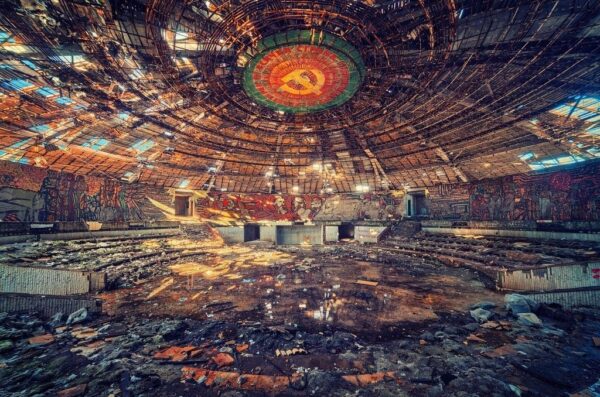
—
Image
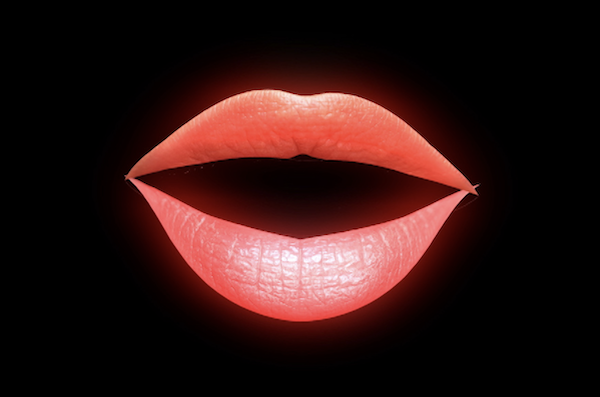
—
POL 120: The Polish Short Story in Translation
MWF 10:00-10:50 AM
Instructor: Justyna Wąsik. 3 hours. CRN: 32280
Where are the edges of storytelling in the times we live in? In this course, we’ll explore & experiment with some of the more vital stories, emerging from the streets & political theatrics; told by the new weather & AI; brought to life through new media, news, new institutions. We’ll make creative use of fiction & nonfiction, contemporary arts, film & music, made in Poland & beyond. Taught in English.
Satisfies Creative Arts or World Cultures GenEd requirement.
Counts towards the Polish Studies Major or Minor, & the CEES (Central & Eastern European Studies) Major or Minor.
POL 150: Introduction to Polish Cinema
Tu/Th 12:30-1:45 PM
Instructor: Prof. Karen Underhill. 3 hours. CRN: 35482
Immerse yourself in one of the world’s great cinema cultures! In this course we explore major movements and genres in Polish Cinema from the 1920s up to the present, including early Polish and Yiddish film, the legendary Polish School of Filmmaking in Łódź, whose directors grapple with the Warsaw Uprising and post-war Communist realities; New-wave crime cinema with its moody jazz aesthetic, cult comedy films of the socialist period, the Polish School of Animation, and contemporary Polish films that explore national memory and 21st century Polish identity.
Films screened with English subtitles. No prerequisites.
Satisfies Creative Arts or World Cultures GenEd requirement.
Counts towards the Polish Studies Major or Minor, & the CEES (Central & Eastern European Studies) Major or Minor.
Image
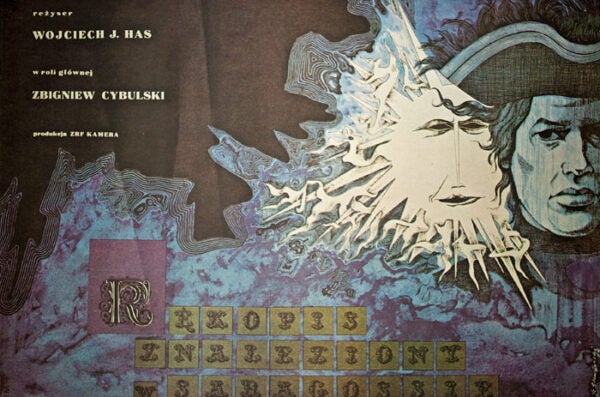
—
Image
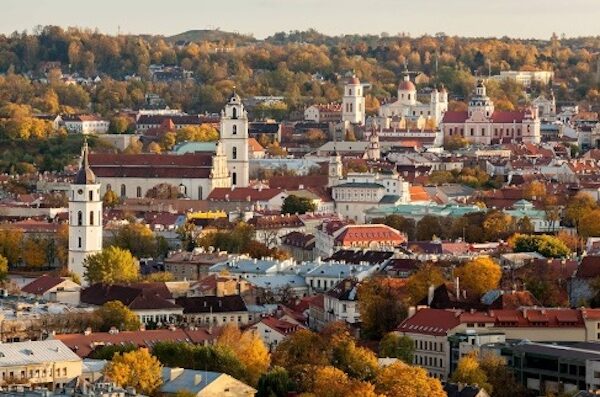
—
LITH 115: Lithuanian Culture
Tu/Th 9:30-10:45 AM
Note: this course will meet ONLINE only, in synchronous remote format.
Instructor: Prof. Giedrius Subacius. 3 hours. CRN: 17548
Lith 115 offers a diversity of insights over the cultural landscape of Lithuania: language, mythology, literature, film, architecture, art, geography, population, emigration, history, resistance, and identity.
We read, watch, and discuss.
All class materials are available online (no textbook).
Satisfies World Cultures GenEd requirement.
Counts towards the CEES (Central & Eastern European Studies) Major or Minor.
RUSS 241: Dostoyevsky
Tu/Th 11 AM-12:15 PM
Instructor: Prof. Matthew Kendall. 3 hours. CRN: 47899
Like many of Fedor Dostoyevsky’s fictional characters, this class is split in two. One half of our plan is to become familiar with Dostoyevsky’s major literary works, some of the most influential and well-known texts of world literature. We will learn how to read these stories and novels about crisis, fear, and salvation within the specific context of Dostoyevsky’s life and times, and we will compile an interpretive toolbox to help us make sense of the ideas and themes that organize his unique creative practice. The other half of our class will be devoted to grappling with the extremely fraught legacy of Dostoyevsky in our contemporary moment. Where can we find Dostoyevsky’s influence in contemporary and popular culture? How should we read and understand him after Russia’s invasion of Ukraine? Why has Dostoyevsky, of all people, become so popular within conservative political movements? What might we have to gain from reading someone with whom we may now struggle to agree or sympathize? All assigned materials are in English translation, and no familiarity with Dostoyevsky or Russia is required or expected prior to taking this class.
Satisfies World Cultures GenEd requirement.
Counts towards the Russian Studies Major or Minor, & the CEES (Central & Eastern European Studies) Major or Minor.
Image
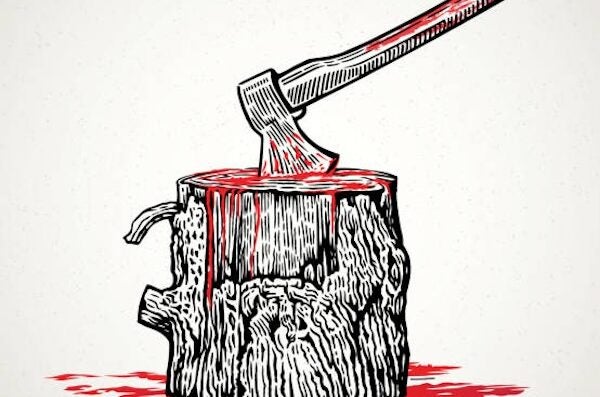
—
Image
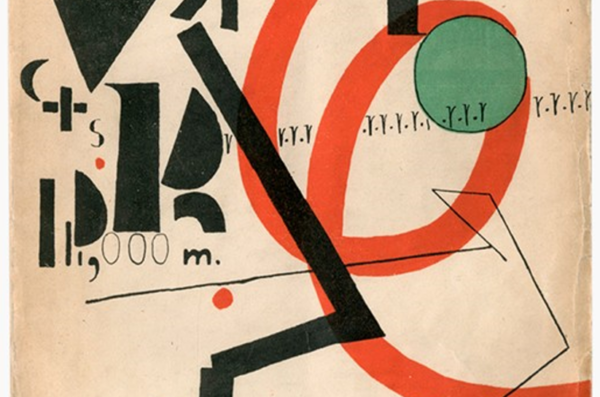
—
POL 242: Polish Poetry for All Readers
Hybrid Format: In-person Tues, 3:30-4:45 PM, remaining material online asynchronous.
Instructor: Prof. Karen Underhill. 3 hours. CRN: 48103
“When I pronounce the word Future,” writes Polish poet Wisława Szymborska, “the first syllable already belongs to the past. / When I pronounce the word Silence, I destroy it.” Polish poets have been destroying silence and pronouncing the future for close to seven centuries – using the poetic word, rhymed or unrhymed, shouted or whispered – to express the human condition, to resist oppression, and to celebrate freedom. In this course we will read and discuss Polish poetry in translation, and ask: how is poetry woven into the fabric of our lives – in song lyrics, children’s literature, folk culture, and political activism? Develop your own relationship to the poems we read through a weekly poetry-reading journal. No prerequisites! First-time readers, or experienced poetry writers – all are welcome. The course is a hybrid format: we meet Tuesdays in person; the rest online asynchronous.
Counts towards the Polish Studies Major or Minor, & the CEES (Central & Eastern European Studies) Major or Minor.
GWS 244 / RUSS 244: Women in Russian Literature
MW 3:00-4:15 PM
Instructor: Prof. Julia Vaingurt. 3 hours. CRN: 34336
This course examines genres, themes, and styles of writing popular among women readers and writers, as well as identifies those writers who choose to defy literary conventions and create outside the domains allotted to women. Students will gain understanding of both gender theory and Russian culture by analyzing women’s self-perception and its rendering in literary form. The authors studied come from different walks of life, social classes, and political identities, and yet most are united by the tendency to question the patriarchal social order and gender normativity. We will study the context for the practice of women reading and writing through the prism of such central Russian literary texts as Eugene Onegin and Anna Karenina. All reading materials, lectures, and discussions are in English. No knowledge of Russian is required.
Satisfies Creative Arts or World Cultures GenEd requirement.
Counts towards the Russian Studies Major or Minor, & the CEES (Central & Eastern European Studies) Major or Minor.
Image

—
Image
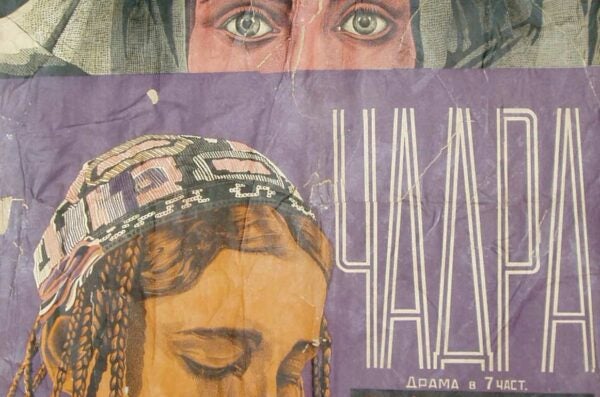
—
CEES 250 / MOVI 250: Eurasian Film & Media Across Borders
Tu/Th 3:30 -4:45 PM
Instructor: Prof. Matthew Kendall. 4 hours. CRN: 48307
This class will offer a wide-angle view of film and media from the always-shifting, always-evolving part of the world called “Eurasia.” In our case, the geography of this region will be largely defined by the borders of the former Soviet Union, and we will explore the evolution of popular, political, official, and independent forms of filmmaking in Ukraine, Russia, Georgia, Kazakhstan, Uzbekistan, Armenia, and Kyrgyzstan. We will put pressure on typical frames of “national” cinemas by thinking about the possibility—and at times, the rejection—of inter- and transnational forms of cinematic influence, reception, cooperation, and exchange. We will explore the history of the October Revolution, the emergence of an internationalist, Soviet popular culture, the collapse of that state and civilization, the places that emerged from underneath it, and trends in contemporary cinemas of Ukraine, Georgia, and Kazakhstan. No familiarity with world cinema, or with any part of the world that has called itself Eurasia is required or expected for the course.
Satisfies Creative Arts or World Cultures GenEd requirement.
Counts towards the Russian Studies Major or Minor, Polish Studies Major or Minor, & the CEES (Central & Eastern European Studies) Major or Minor.
LCSL 250: Introduction to Comparative Cultural Studies (Same as CEES 224/225)
Tu/Th 9:30-10:45 AM
Instructor: Prof. Michał Markowski. 3 hours. CRN: 47219
One of the most essential and desirable skills in today’s divided and conflicted world is understanding how people live, work, and create in a multicultural environment. Join us as we explore how authors and artists represent and problematize the boundaries of national and cultural identities. Is culture a “biased” term or “neutral? Is it universal? Is culture a political idea, or it shies away from politics? What is the relationship between culture and civilization? Are different cultures comparable? How does globalization impact artistic individuality? What is globalization? How does translating texts and cultures allow the global circulation of ideas? The course will help students better comprehend how the specificity of national cultures is appropriated and consumed by readers and audiences across the “world.” The course will also explain the origin of categories and concepts we use when speaking about culture. Emphasis on diverse worldviews across Europe, Latin America, Asia, and Francophone cultures and their interactions. Competencies developed: analysis, critical thinking, equity & inclusion, and intercultural communication. The course format implies active participation and discussion of reading materials in English.
The course format implies active participation and discussion of reading materials in English. Counts as CEES 224/225.
Prerequisite(s): Credit or concurrent registration in ENGL 160 or 161 or completion of the English composition requirement.
Satisfies Creative Arts or World Cultures GenEd requirement.
Counts towards the Russian Studies Major or Minor, Polish Studies Major or Minor, & the CEES (Central & Eastern European Studies) Major or Minor.
Image

—
Beginning and Intermediate Language Courses
| Course | Time | Instructor | Prerequisites | Credit/CRN | Room |
|---|---|---|---|---|---|
| LITH 102: Elementary Lithuanian 2 | MW, 8-9:15 AM | Karilė Vaitkutė | Grade of C or better in LITH 101 or the equivalent, *or* successful placement test | 4 hours. CRN: 34457 | TBA |
| LITH 104: Intermediate Lithuanian 2 | TuTh 8-9:15 AM | Karilė Vaitkutė | Grade of C or better in LITH 103 or the equivalent, *or* successful placement test | 4 hours. CRN: 35480 | TBA |
| POL 102: Elementary Polish 2 | MWF 11-11:50 AM | Jamie Lin | Grade of C or better in POL 101, or the equivalent, *or* successful placement test | 4 hours. CRN: 18059 | TBA |
| POL 104: Intermediate Polish 2 | MWF 11-11:50 AM | Katarzyna Majchrowicz-Wolny | Grade of C or better in POL 103, or the equivalent, *or* successful placement test | 4 hours. CRN: 35481 | TBA |
| POL 104: Intermediate Polish 2 | MWF 2-2:50 PM | Katarzyna Majchrowicz-Wolny | Grade of C or better in POL 103, or the equivalent, *or* successful placement test | 4 hours. CRN: 34332 | TBA |
| RUSS 102: Elementary Russian 2 | MWF 11-11:50 AM | Aleksandra Khuzina | Grade of C or better in RUSS 101 or the equivalent, *or* successful placement test | 4 hours. CRN: 17669 | TBA |
| RUSS 102: Elementary Russian 2 | MWF 12-12:50 PM | TBA | Grade of C or better in RUSS 101 or the equivalent, *or* successful placement test | 4 hours. CRN: 17668 | TBA |
| RUSS 104: Intermediate Russian 2 | MWF 11-11:50 AM | Ekaterina Petrenko | Grade of C or better in RUS 103 or the equivalent, *or* successful placement test | 4 hours. CRN: 17670 | TBA |
| RUSS 104: Intermediate Russian 2 | MWF 12-12:50 PM | Ekaterina Petrenko | Grade of C or better in RUS 103 or the equivalent, *or* successful placement test | 4 hours. CRN: 46837 | TBA |
Advanced Language Courses
Image
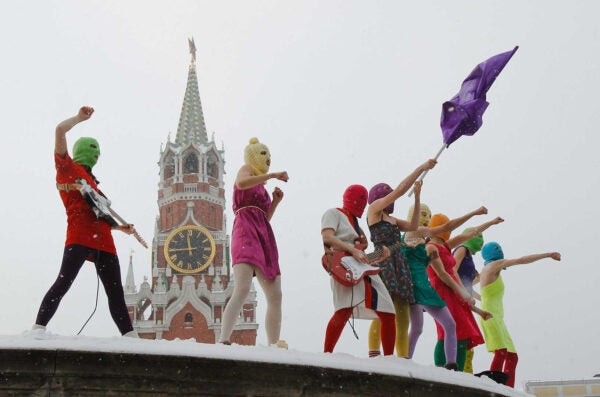
—
RUSS 202: Advanced Russian through Contemporary Culture
MWF 2-2:50 PM
Instructor: Alena Kiianichenko. 3 hours. CRN: 34658. Prerequisite: RUSS 104
The course is intended for advanced Russian students. You will get acquainted with contemporary cultural art production in Russia (film, animation, music, performance, etc.) from the 1990s to the present day. Course materials include pop culture, pulp fiction, and the internet. The goal of this course is to improve different language skills: reading, writing, listening, and speaking. All materials are available online.
Counts towards the Russian Studies Major or Minor, & the CEES (Central & Eastern European Studies) Major or Minor.
POL 202: Advanced Polish through Contemporary Culture
MWF 1-1:50 PM
Instructor: Prof. Izolda Wolski-Moskoff. 3 hours. CRN: 34333. Prerequisite: POL 104
Development of skills in spoken and written Polish within the context of contemporary Polish culture, using a variety of sources such as news articles, comics, music, and more.
Counts towards the Polish Studies Major or Minor, & the CEES (Central & Eastern European Studies) Major or Minor.
Image
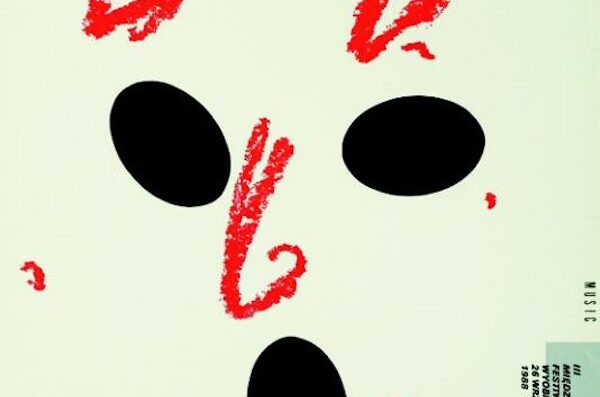
—
Advanced Undergraduate and Graduate Courses
POL 460: Capturing Catastrophe: Central and East-European Environmental Disturbances in Cinematic Media
Thurs. 5-7:30 PM
Instructor: TBA 3 or 4 hours. CRN: 31360 (Undergraduate), 31788 (Graduate)
The participants will travel across post-socialist and post-dependency states of Central and Eastern Europe to places where the impact of catastrophes has been intensely felt by human and non-human communities over the last thirty years. What challenges filmmakers face when trying to give a cinematic account of an environmental catastrophe? How can a medium which captures a catastrophe intervene in the public discourse and influence collective imaginary? What does a given medium bring to the foreground, and what (and why) is left outside of the frame? The course invites the participants to take a closer look at how these degraded, toxic landscapes are captured by cinematic media – not only feature films, but also documentaries, mockumentaries, television shows, fictionalized and speculative cinematic formats as well as performance-based video art.
Each session will be centered around an exemplary cinematic work which will provide a starting point for an in-class discussion. The goal of the course is to demonstrate to what extent the cinematic representation of environmental catastrophes is conditioned by cultural, historical and social factors. We will therefore see what social role art and culture have to play in times of ecological crises, providing ways of seeing, knowing and feeling the catastrophes already happening around us and those yet to come.
Counts towards the Polish Studies Major or Minor, & the CEES (Central & Eastern European Studies) Major or Minor.
Image
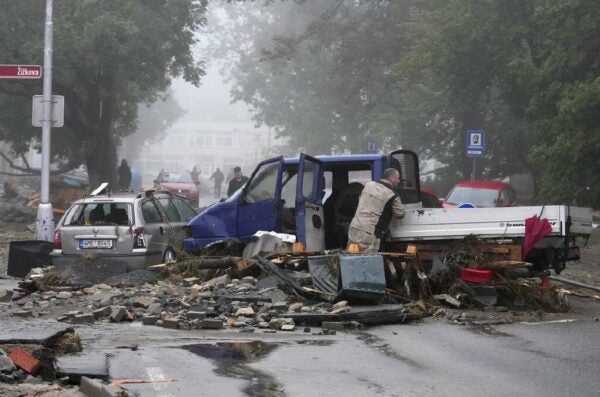
—
Image
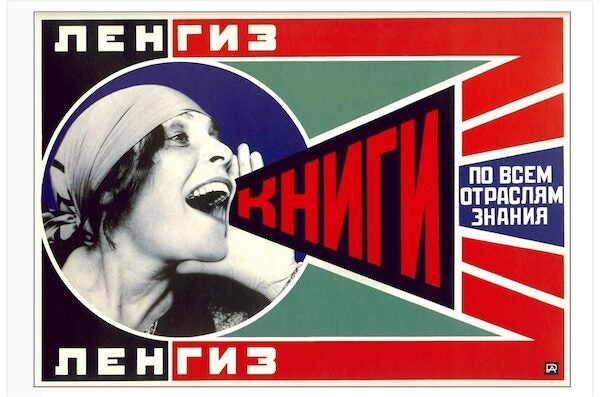
—
RUSS 460 / AH 460: The Soviet Avant-Garde
Mon. 5-7:30 PM
Instructor: Prof. Julia Vaingurt. 3 or 4 hours. CRN: 26657 (Undergraduate), 39590 (Graduate)
Examines the term “avant-garde” and its referents before and after the October Revolution of 1917. Considers such movements as Cubo- and Ego-Futurism, Neo-Primitivism, Suprematism, Biomechanics, and Constructivism. Studies avant-garde practices in literature, film, architecture, and visual and performing arts. Topics treated will include the impact of new technologies; relationship between art and politics; cross-pollination between media; blending of borders between high art and mass culture; abstraction and figuration; war and revolution; gender and representation; and the utopian impulse to have the arts redesign society as a whole. Works of Soviet artists will be analyzed not only in their political and historical context, but also in the theoretical and artistic context of the European avant-garde.
Counts towards the Russian Studies Major or Minor, & the CEES (Central & Eastern European Studies) Major or Minor.
CEES 406: History of European Standard Languages
Tues. 3:30-6 PM
Note: this course will meet ONLINE only, in synchronous remote format.
Instructor: Prof. Giedrius Subacius. 3 or 4 hours. CRN: 36277 (Undergraduate), 36276 (Graduate)
If “a language is a dialect with an army and a navy,” then among the many dialects that make up a language, the standard variety has the largest military. This course is all about the phenomenon of “standard languages.” The standard variety is primarily written with the goal of providing linguistic uniformity in the face of social diversity. Standard languages are often thought of as prestigious, “most beautiful,” and may serve as a symbol of national identity while also being the official language of a country. We will analyze and discuss the “birth” and development of language standards, the development of individual standard languages, and we will see emerging historical–theoretical patterns. Some standards were initiated by kings, others—by intellectuals of peasant origin. Of over 50 present standard languages in Europe, a number will be investigated, compared, and classified: English, German, Albanian, Estonian, Greek, Yiddish, Italian, French, Spanish, Lithuanian, Polish, Ukrainian, Norwegian, Croatian, Serbian, Luxembourgish, Russian, etc.
Image
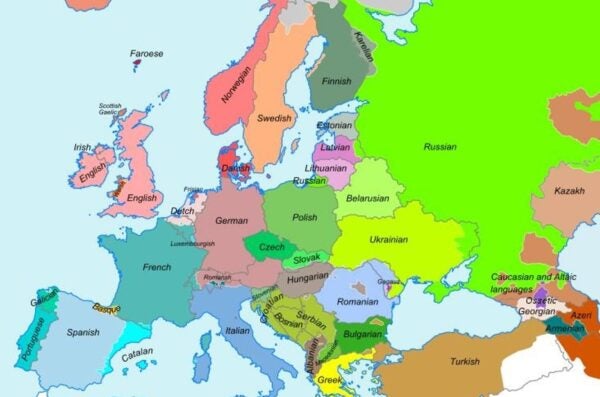
—
Image
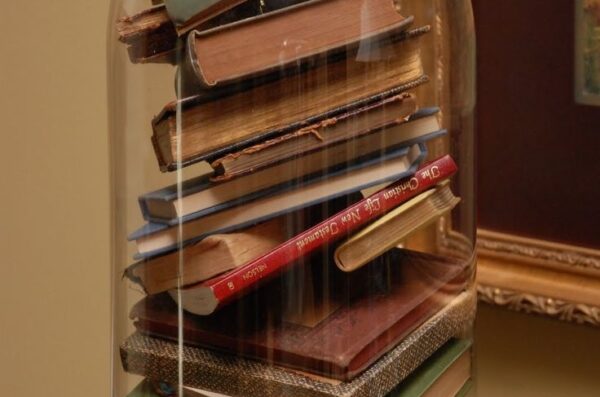
—
CEES 551: Why, How, and For What Purpose To Read? A History of Interpretation in the West.
Weds. 6 -8:30 PM
Instructor: Prof. Michał Markowski. 4 hours. CRN: 43733
Although we all read, not everybody reflects on how this act happens: what are the reasons for reading, what are the—personal, social, cultural, political—ramifications of dealing with a text, and finally, who reads? Is it our inimitable individuality involved in reading, or is it our socially shared subjectivity that peruses books? Is it us who reads, or does something larger read through us? Is our reading idiomatic or institutionally driven? Instead of following contemporary theories of reading or applying those theories to individual texts, we will trace back the long and complex history of interpretation in the West from ancient Greece and Rome through the religious discord on the meaning of the Scriptures and establishing hermeneutics as a particular branch of humanities to the most recent discussions about interpreting the American Constitution. As there is no comprehensive history of interpretation embracing the entire course of Western civilization, combining politics and theology with philology, we will sketch its chapters in the class devoted to understanding how people justified their readings through the ages, from the Greeks, Augustine to Luther, Heidegger, and Supreme Court Justice Scalia. The class will be taught, and all materials will be provided in English, so all LAS graduate students are welcome to participate in the interdisciplinary discussion on how we have been reading and why. Course will be taught in English.